We are back at our normal venue from 3rd Sept. 2021 |
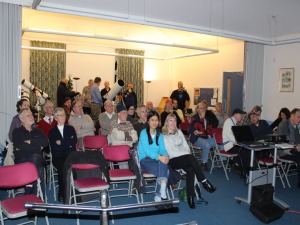
This page lists our monthly meetings. For other events open to the general public, see our Events page
Dates are set well in advance but the 'content' of the meeting is only updated (from our 'meetings database') when details are entered, so 'blank' or 'TBA' may be shown when data has not yet been entered (please be assured that the meeting will take place and a talk on (some) Subject will be delivered by (some) Speaker ! )
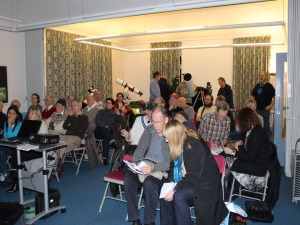
During the COVID-19 restrictions, all meetings are being held on-line using ZOOM. Meetings are normally held at the Church Hall (aka 'The Soltau Center') of St James-the-Less, Stubbings, Maidenhead SL6 6QW, from 7.30 (for a ZOOM link, or map and directions, see the About MAS (Where we meet) page
The Main Topic is usually delivered by an invited guest speaker. We aim to provide a diverse range of subjects linked (in some way) to Astronomy - whilst the 'Second Session' is typically delivered by one of our members. If time allows, the evening concludes with a short 'What to see this month'.
Details of a typical evening (times are approximate) :- 7.30pm. The evening starts with the Chairman delivering any important Announcements and then introducing the main speaker. 7.45pm (latest). Main Topic Speaker gets up and the lights are turned off. If you arrive after 7.45, please enter the Hall by the first door (on the right, after the entrance) and please be extra careful when finding a seat at the back of the Hall as members often setup telescopes there ! 8.45-9pm +. Coffee break during which visitors often chat with members who have set-up their telescopes at the back of the hall. If the weather is good, sometimes members will nip out for a quick look at the sky. Smoking is permitted outside the Hall, however smokers are asked to avoid any 'observers' (smoke particles always seem to get into optical equipment, no matter how well 'sealed' it may be) 9.15pm (at the latest). The 'Second Session' then runs for about 45 mins, typically ending with "What's Up !" (what to look out for in the sky this month) 10pm. We aim to clear the hall by 10pm. Post meeting Observing. If the weather is good, the Observing Organiser then leads the way to our chosen observing site, or (if the weather looks even a slight bit 'iffy) members sneak off to the local Pub instead :-)
Next meeting :
(+) 7 Jun 2024 MAS 67th AGM - (Annual General Meeting)
Meetings Archive |
The meetings archive gives an 'overview' of the Society activities over the past 10 years (see also the Events page).
Members have access to the full 'History of MAS' (including AGM minutes going back to 1957) along with full names and photos
The MAS 'year' runs from September of one year to June of the following. The end of year AGM in June elects the Committee for the following year (there are no meetings in July and August - although often members will meet informally at the local pub - which gives the new Committee time to 'get a grip' on running the Society)
The "short cuts" (in the 'title bar', at the very top of this page) will take you to the June AGM entry for the end of that MAS year
The Maidenhead Astronomical Society meetings archive (last 10 years only)
Missed a meeting, or can't remember when a topic was last covered ? Here is the archive of past MAS meetings.
Note that this list covers only our monthly meetings and AGM's. Reports on Observing and Other Events are separate pages
If notes were taken at the meeting, the date below is underlined and shown with a '(+)' = click to see the notes (if no '(+)' is shown, no notes were taken - or, more likely, the webmaster hasn't found them and posted them up yet :-) )
(+) 3 May 2024 The Exploration of Venus - (Jim House)
(+) 5 Apr 2024 The Visible Universe - (Doctor Max Whitby)
(+) 1 Mar 2024 Water in the Universe - (Prof Jonathan Tennyson)
(+) 2 Feb 2024 The Mechanics of Eclipses - (Sheridan Williams FRAS)
(+) 5 Jan 2024 Telescope Parade - (and the Parker Solar Probe by Arthur White)
(+) 1 Dec 2023 SPECIAL FEATURE Herschels Lunatick Friends - (Andrew Lound)
(+) 3 Nov 2023 Binary Pulsars Einsteins Perfect Laboratories - (Barry Kellett)
(+) 6 Oct 2023 Solar Space Weather SOHO - (Dr Eric Dunford)
(+) 1 Sep 2023 The Changing Climate of Mars - (Peter Read)
(+) 2 Jun 2023 MAS 66th AGM - (Annual General Meeting)
(+) 5 May 2023 Two talks by members - (LATE CHANGE)
(+) 31 Mar 2023 Overview of telescopes and mounts - (Dave Hayes)
(+) 3 Mar 2023 Study of our Galaxy in the Era of Gaia - (James Binney)
(+) 3 Feb 2023 The Galaxy without a dark side - (Barry Kellett)
(+) 6 Jan 2023 Telescope Parade and Workshop - (by members)
(+) 2 Dec 2022 Xmas Social Photo Comp and Quiz - (set by members)
(+) 4 Nov 2022 Exploration of Jupiter - (Dr Mike Legett)
(+) 7 Oct 2022 The Lunar 100 - (Dr Lilian Hobbs)
(+) 2 Sep 2022 InfraRed Astronomy - (Dr Eric Dunford)
(+) 10 Jun 2022 MAS 65th AGM - (NOTE 2nd Friday)
(+) 6 May 2022 Gravitational Waves - (Joshua Pooley)
(+) 1 Apr 2022 Saturn - (Michael Foulkes)
(+) 4 Mar 2022 Update on the Exploration of Mars - (Jim House)
(+) 4 Feb 2022 What Astronomy Tells Us About The Origins of Life On Earth ? - (James Hough)
(+) 7 Jan 2022 Telescope Parade and Workshop - (by Members)
(+) 3 Dec 2021 Christmas Quiz set by members - (followed by Social Evening)
(+) 5 Nov 2021 CANCELLED - (Hall closed)
(+) 1 Oct 2021 Dark Nebulae - (Owen Brazell)
(+) 3 Sep 2021 How we reached the Moon - (Jerry Stone)
(+) 4 Jun 2021 63rd AGM (ZOOM on line meeting)
(+) 7 May 2021 Milestones in Astronomy - (Rod Hine (ZOOM on line meeting))
(+) 2 Apr 2021 The Red Sun - (Lyn Smith (ZOOM on line meeting))
(+) 5 Mar 2021 Tour of the Universe - (Jane Green (ZOOM on line meeting))
(+) 5 Feb 2021 Space Vehicles - (Graham Bryant (ZOOM on line meeting))
(+) 8 Jan 2021 The Astronomer's Toolkit - (Dr Lee Anne Willson (ZOOM on line meeting))
(+) 4 Dec 2020 Xmas Quiz - (set by members (ZOOM on line meeting))
(+) 6 Nov 2020 The Monster in the Crab - (Gary Poyner (ZOOM on line meeting))
(+) 2 Oct 2020 Is there anyone out there ? - (Bob Mizon (ZOOM on line meeting))
(+) 4 Sep 2020 Two eyes are better than one - (Stephen Tonkin (ZOOM on line meeting))
(+) 5 Jun 2020 COVID19 Postponed MAS 62nd AGM
(+) 1 May 2020 COVID19 Postponed The Monster in the Crab - (Gary Poyner)
(+) 3 Apr 2020 COVID19 meeting CANCELLED
(+) 6 Mar 2020 Recent Developments in Gravity Wave Research - (Martin Dyer)
(+) 7 Feb 2020 Ask an expert Q and A panel - (By Members)
(+) 3 Jan 2020 Equipment Parade - (By members)
(+) 6 Dec 2019 Xmas Quiz and social - (By members)
(+) 1 Nov 2019 The Origin of the Solar System - (James Fradgley)
(+) 4 Oct 2019 Kew Observatory and the origins of modern solar physics - (Dr Lee Macdonald)
(+) 6 Sep 2019 History of Mars Exploration - (Jim House)
(+) Aug 2019 Summer break - (no meeting)
(+) Jul 2019 Summer break - (no meeting)
(+) 7 Jun 2019 MAS 61st AGM - (and Photo Competition prizes)
(+) 3 May 2019 13 Journeys in Space and Time - (Colin Stuart)
(+) 5 Apr 2019 Space Weather - (Dr Colin Forsyth)
(+) 1 Mar 2019 The Extremely Large Telescope (ELT) - (Dr Aprajita Verma)
(+) 1 Feb 2019 Ask the Expert - (members panel)
(+) 4 Jan 2019 Equipment exhibition - (and EGM)
(+) 7 Dec 2018 Christmas Quiz and Social
(+) 2 Nov 2018 Short talks - (by members)
(+) 5 Oct 2018 The Future is out of this World - ( Dr Stuart Eves FRAS)
(+) 7 Sep 2018 13 Journeys through space and Time - (Postponed new date TBA)
(+) Aug 2018 Summer break - (no meeting)
(+) Jul 2018 Summer break - (no meeting)
(+) 1 Jun 2018 MAS 61st AGM - (and Photo Competition prizes)
(+) 4 May 2018 Using Video and an Aurora Encounter - (by members)
(+) 6 Apr 2018 Berkshire Astronomers - (Kenelm England FRAS)
(+) 16 Mar 2018 NEW DATE Jupiter and the Juno Mission - (Dr John Rogers)
(+) 2 Feb 2018 Talks by Members
(+) 5 Jan 2018 Telescope and Equipment workshop - (Q and A with members)
(+) 1 Dec 2017 Xmas Quiz and Social - (Quiz Master Tim H)
(+) 3 Nov 2017 Wonders of the Deep Sky - (Callum Potter)
(+) 6 Oct 2017 Observing the Sun - (by MAS members)
(+) 1 Sep 2017 Gravity Waves - (a recap by Martin Dyer)
(+) 2 Jun 2017 MAS 60th AGM - (and Photo Competition prizes)
(+) 5 May 2017 Novae - (Jim H)
(+) 7 Apr 2017 Comets - (Kenelm England)
(+) 3 Mar 2017 Pseudoastronomy - (Stephen Tonkin)
(+) 3 Feb 2017 Members short stories
(+) 6 Jan 2017 Telescope Parade - (exhibition by members)
(+) 9 Dec 2016 (note 2nd Friday) Christmas Quiz - (and members shorts)
(+) 4 Nov 2016 Observing Planetary Nebulae - (Owen Brazell)
(+) 7 Oct 2016 Astro tourism - (David Phillips)
(+) 2 Sep 2016 Rosetta Space Mission - (Andrew Morse)
(+) 3 Jun 2016 MAS 59th AGM - (and Photo competition results)
(-) 6 May 2016 Build a recording spectrometer John Paraskeva - (2nd half Spectrometer results Alun Halsey)
Friday, 6th May 2016 - How to build a recording spectrometer for a telescope - John Paraskeva (Reading AS )
Second half: Alun H: Results from his home made Spectroscope.
How to build a recording spectrometer for a telescope - John Paraskeva
John Paraskeva is the author of the Basic Astronomical Spectroscopy Software (aka BASS Project) spectroscopic analysis software (see at end, below)
John started with a quick overview of what spectroscopy is all about and what it can reveal about the 'target' star. Basically, the goal is to spread or split the light from a 'target' (usually, a star, but any light 'source', including nebulae, galaxies and even planets) into it's constituent wavelengths.
The relative intensity of the different wavelengths then reveals a wealth of information - in addition to the composition of the star you can measure it's temperature, velocity (by Doppler shift, both 'red shift' and rotational) density and even it's magnetic field.
John then looked at the various different types of Spectroscope. All require some sort of camera to record the result - a B&W camera being almost a 'must' (all colour cameras - such as a DSLR - have a 'bayer matrix' that will 'filter' the constituent wavelengths into 'RGB' and distort their intensities)
The first spectroscopes (Joseph von Fraunhofer, 1814) used prism's to split the light, however these days 'diffraction gratings' are used instead.
The most basic spectroscope is simply a 1 1/.4" screw in filter 'transmission grating' that you place in the light path. These devices (such as the 'Star Analyser') are (as usual) 'astronomically' priced (£100 - £200) and typically have relatively low 'line counts' (lines/mm, such as the 100 lpmm = SA-100 or 200 = SA-200) which limit the resolution of the result. Lower counts are suitable for tiny 'web-cam' sensors (which, in effect, 'magnify' the spread), whilst the higher counts (which give more 'spread') are only suitable for larger telescopes (> 8") with larger sensors (such as those found in DSLR). The 'filter' just spreads everything in the field of view 'sideways', which can be an advantage as it gives you the spectrum of multiple sources 'simultaneously' (so you can include a 'known' star to act as a 'calibration' whilst capturing an 'unknown', such as a supernova). It's to be noted that smaller telescopes work best with transmission gratings.
Photo below: Alun H. SA-100 'full field view' spectrum spreads out 'sideways' (contrast and brightness enhanced to bring out the Ring Nebula - the 'zero order' (very faint) source can be seen center with 0III and H-alpha emission 'lines' (bright rings) right). Click the image for a better view
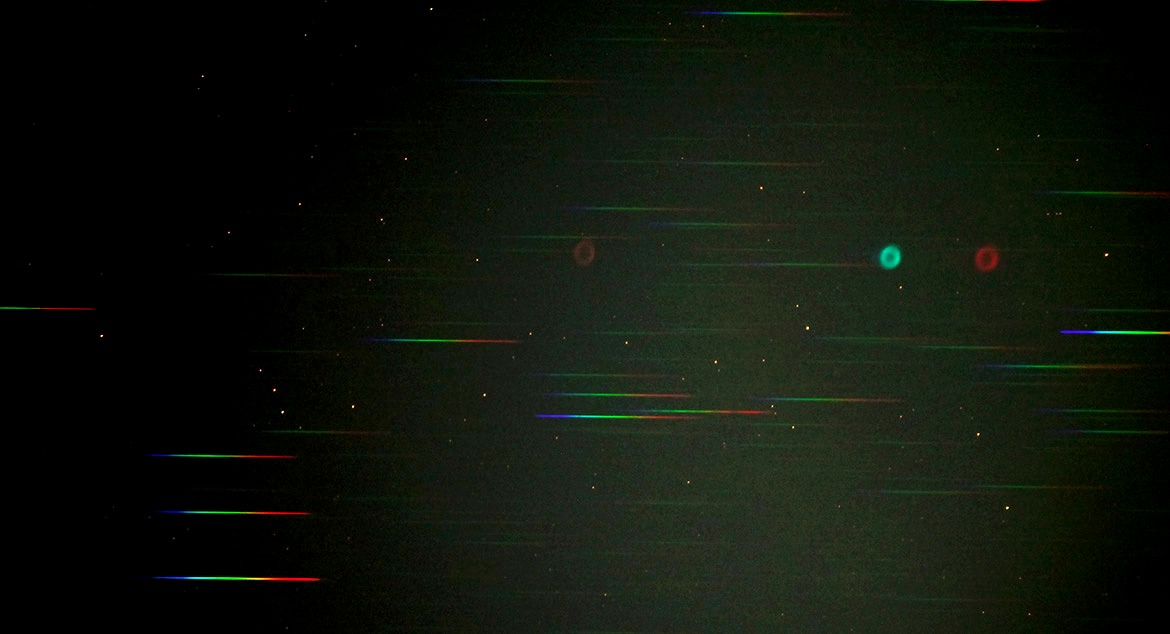
Ed. You don't have to pay a fortune to get into spectroscopy - see, for example, how to build a mini Spectroscope using a music CD. It's also worth noting that materials for a DIY spectrometer need not be expensive. You can find high resolution diffraction 'gratings' (1000 lpmm and above) are available in photographic 'slide' form for a few $'s and intended for visual use as 'teachers aids'. It's even possible to purchase 2.5" prisms for less than $10 ! However the quality of these can be very variable - from 'usable' to 'toy' - and anything over 100 lpmm is 'difficult' (read, 'almost impossible') to use with small telescopes, not-too-solid mounts and less than perfect tracking :-)
Other types of spectroscope start with a 'target selection slit' at the focal point of your telescope. It's main function is to block out the light from other stars, so the spectrum is formed by the single 'target'. Most are adjustable in both position and 'gap' - the position lets you 'select' any 'target' star in the field of view (by using the slit, rather than by having to adjust the telescope itself). The size of the gap determines the 'width' of the spectral lines - so whilst the smaller the gap the 'finer' the lines and thus the better the 'accuracy', a smaller gap means lower light intensity (and thus longer exposure times), so, for high accuracy work, some form of 'auto-guiding' is a must.
Adjustable slit's also have one real problem (of course) - that of repeatability. When observing a variable star (for example, a new nova in a distant galaxy), it's hard to adjust the slit 'gap' to exactly the same size on each successive nights observing.
One type of (non-adjustable) DIY slit is simply a 'scratch in a 90 degree diagonal mirror'. The light that traverses the slit is fed to the spectroscope whilst the rest of the field of view is available for visual alignment and auto-guiding
Following the slit, a lens must refocus the 'target' light into a parallel beam. This is then fed to the diffraction grating - of which there are two types, 'transmission' and 'reflection' (reflection types being more common ?). After the spectral lines are formed, a focusing lens passes the result to the camera.
The final type is the Littrow design. This has a single collimating lens and uses a reflection grating. The light from the slit is fed in 'off axis' as it passes through the lens to the grating and then the reflected spectral lines are passed back through the same lens but now 'on axis' (so exit at a different angle) and are passed to the camera. It's major advantage is that you get a long focal length in a small space and, for a given price, higher resolutions (i.e. higher diffraction grating lpmm counts = 1,000-2,000 being typical) can be achieved. It's main drawback is that it really needs long focal length telescopes (f/8 - f/10).
"Whats Up" - Robin
To give Alun extra time after the break, Robin launched his May 2016 Stellarium script and gave us a quick tour of the Constellations 'pointed to' by the stars of the Great Bear.
Of particular note are the multitude of DSO's (Deep Sky Objects) to be found close to the Bear - especially Nebula such as M82 ('Cigar'), M108 ('Surfboard') with ('Owl') and M101 ('Pinwheel')
Of course the big event of this month is the Transit of Mercury on Monday the 9th ! Percy will be leading our observing efforts in Ockwell's Park from midday (first contact will be 12.12) onward
Alun H: Spectroscope results.
Alun first gave a quick overview of his home made Spectroscope which he was showing off at our January meeting. This was a classical style adjustable slit spectroscope.
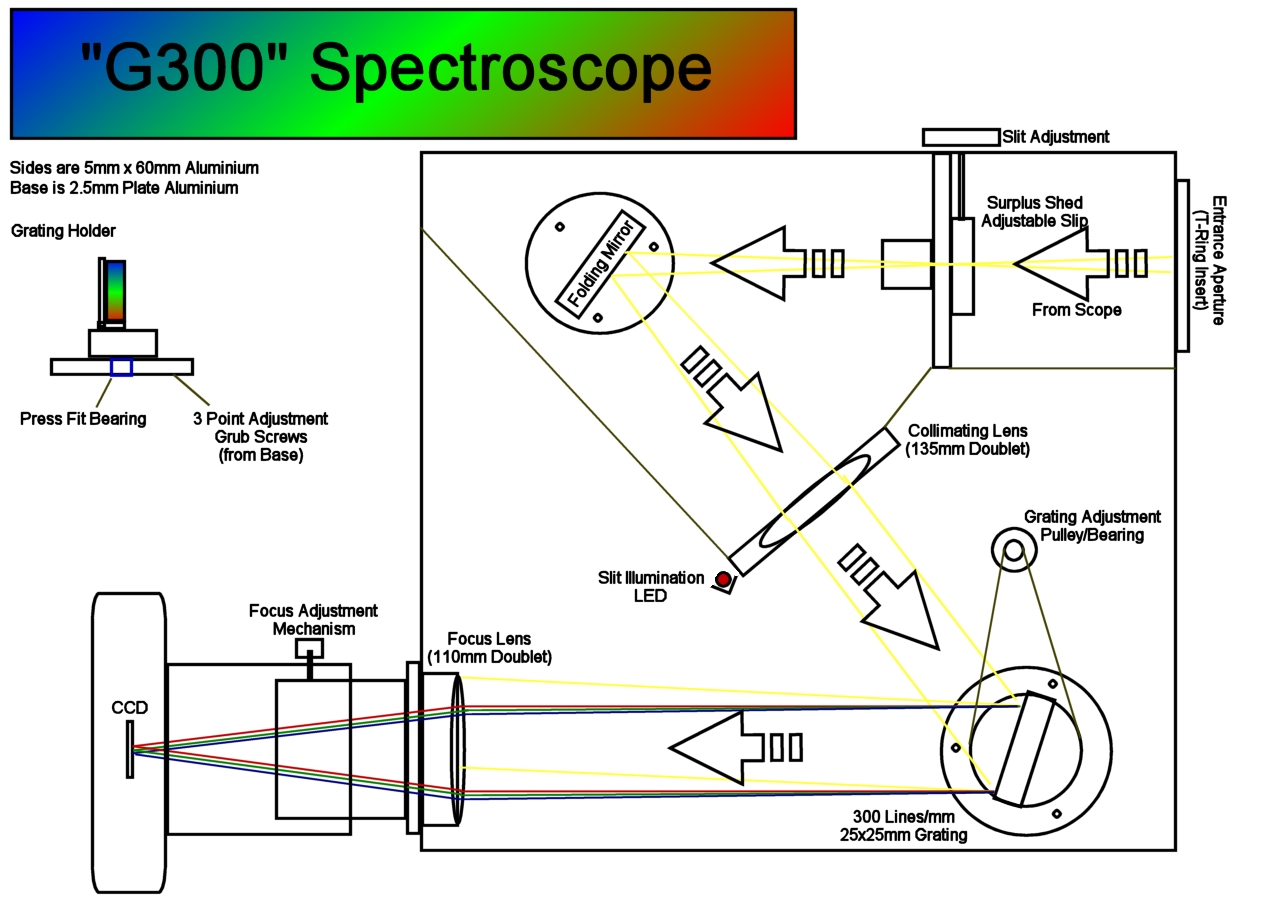
In short, he found it's performance rather disappointing, so rather quickly rebuilt it using details of a DIY design found on-line, the 'G300'.
However, even this failed to generate the results he was hoping for, so he decided to 'bite the bullet' and purchase a commercial instrument (with auto-guider).
He then displayed some of the many 'New Folder' results he obtained, which were most impressive (if a little hard to find, hidden as they were multiple layers of 'New Folder (N)' down :-) ) BASS Spectroscopic Analysis software
The de-facto standard is John Paraskeva's BASS Project software. Whilst Open Source, it is not hosted at SourceForge. Instead, for the latest information (and new version releases), visit the BASS Yahoo Group (the Dropbox link to download the software can be found in the latest Release Notes document)
Below: Alun H. Cropped 'spectral line' photo imported into BASS (shown top of image below) and it's spectral analysis (graph below) showing absorption lines for Vega. This is a good choice to start with, as it will help you 'calibrate' your system and confirm your DIY design is working (or not :-) ) as expected. Click the photo for a better view
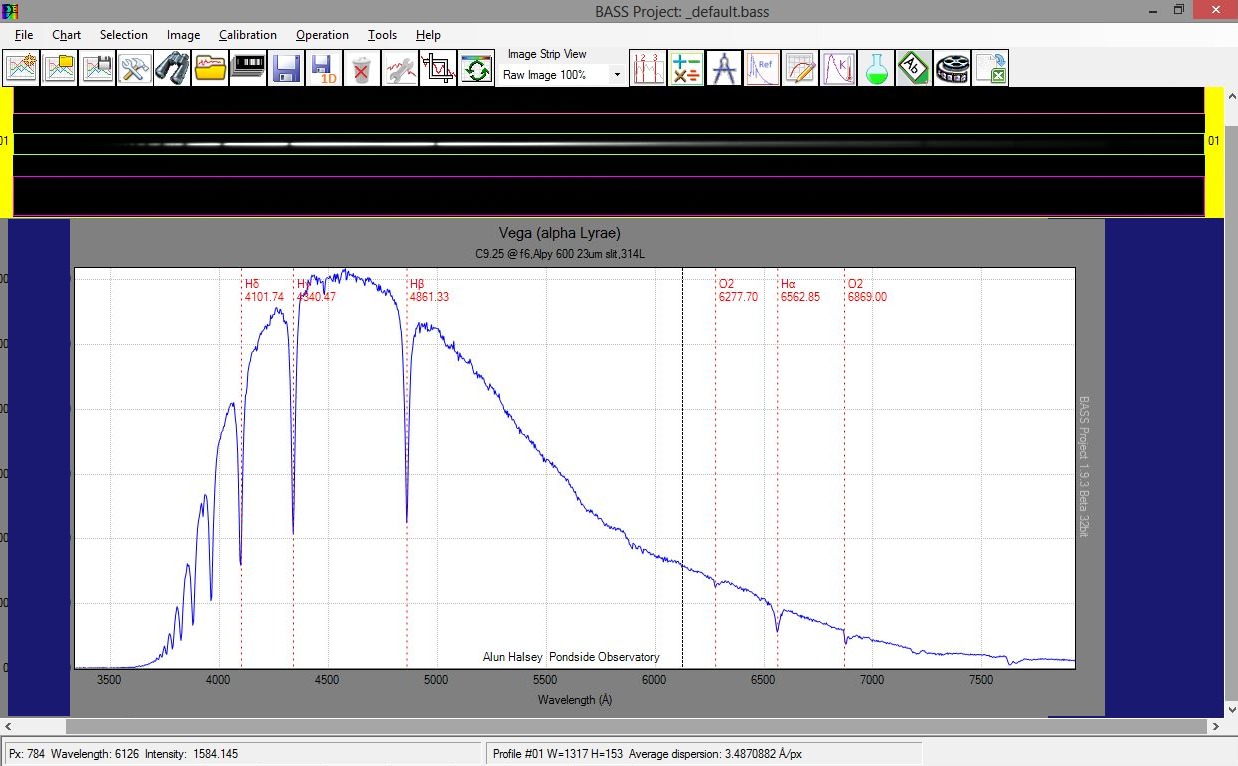
The BASS installation instructions (and download link) for v1.9.3 are copied here BASS 1.9.3 release notes (pdf). If you have difficulty following the download link given in the PDF, the msi installer is copied here :- BASS v1.9.3 software (.msi)
Additional resources
A really comprehensive list of additional spectroscopy links can be found on this page of the www.stargazing.net site.
All our indoor Meetings are open to the public, however non-members are asked to make a contribution of £2 toward the hall hire costs (this may be collected by Fred, our Membership Secretary, at the door on arrival, or left at the 'Tea hatch' at half time).
This note last modified: 11th Jun 2019 09:21.